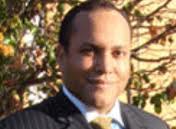 Kenneth Tolson said the success of majority schools in monetizing their research and technology serves as a model for HBCUs.
Kenneth Tolson said the success of majority schools in monetizing their research and technology serves as a model for HBCUs.Recognizing a large gap in technological training at many historically Black colleges and universities, representatives of the HBCU community launched an effort to stream a tech-based entrepreneurship initiative at Black institutions.
The United Negro College Fund (UNCF), in partnership with the White House Initiative on HBCUs, led the effort organizing the “HBCU Startup and Innovation Initiative.”
Created mainly to expose Black students to the leading practices within STEM education, this project will be used to enable tech-based commercialization on Black campuses.
In response to President Obama’s call to increase minorities in STEM fields amid the lacking amount of tech-transfer programs at HBCUs, the initiative will train both students and faculty on how to build a successful tech venture. Dr. Chad Womack, project lead and UNCF director of STEM education initiatives, raised his hands to “grandfather” the proposed goal.
“In part of a longer conversation that I’d been having with my Morehouse [College] colleagues, we’ve been talking for years about the lack of competitiveness and innovation among our HBCU institutions,” Womack says.
Womack, a 1988 graduate of Morehouse College, was invited to attend a White House Technology Inclusion summit in August. Womack joined education leaders, investors and technological entrepreneurs to promote solutions around diversity inclusion, STEM education and entrepreneurship. The initiative will be separated into three primary goals: exposing, educating and empowering HBCU students and faculty.
Thus far, members of this project are focused on exposing the HBCU community to tech-based entrepreneurship by reviewing models, such as capitalist ventures like Facebook and Google. After exposure, project members created “boot camps” in order to train students to build profitable business ventures, which will transfer into capital or “empowerment,” according to Womack.
While no HBCUs have committed to a formal partnership as of yet, schools like Norfolk State University and Morehouse College have shown interest. However, Womack explains that the project would best be executed if it starts on a small number of HBCU campuses and after further development, transfers to remaining schools.
“To be quite frank, I don’t think every HBCU would be interested. We do have an idea of maybe 10 to 12 schools, but it’ll be like the ‘coalition of the willing’ and then we can expand from there,” Womack says.
Even more challenging than gathering the participation of all 105 HBCUs is raising capital for the effort, says Womack. With support from several HBCU advocacy organizations like UNCF and the White House Initiative, the project will lead an HBCU Innovation fund comprised of donations by supporting investors. However, the fund will initially capitalize from 1 percent, or $10 million, of HBCU endowments that are leveraged as institutional investment capital funds.
According to Womack, the return on investment will accrue shortly after building up necessary resources. He says, echoing other HBCU leaders, that the geographical competitive advantage of HBCUs is a component that is sure to bring successful results to tech-based innovation.
“Interestingly, most HBCUs exist geographically within vibrant regional ecosystems and economies, but they are not connected. So there is no deal flow, where capital meets entrepreneurship to create more opportunity,” Womack says.
However, deal flow is certainly not the problem at schools like Stanford University, where the close proximity to Silicon Valley has grown the school’s technological resources tremendously. At Stanford, there is a Technology Venture Program, which develops research around successful tech projects for its students and faculty. The program, among other entrepreneurship initiatives, has produced a base of Stanford students and alumni who’ve started more than 39,000 companies and have collectively made $2.7 trillion in revenue.
Kenneth Tolson, project adviser of the HBCU Startup Initiative and board member of the White House Initiative on HBCUs, says the success of Stanford alumni and faculty has become one of the motivating factors for HBCUs to build successful entrepreneurs within their own communities. Universities like Stanford have received grants, contracts and other science-specific government funding through the commercialization in tech research. Tolson says that many schools often have sold tech research to government agencies in order to commercialize STEM efforts.
“When you look at schools like Stanford, UPenn, MIT, Michigan, these big majority schools have been doing very well commercializing their science and technology,” Tolson says.
Tolson continues, “Unfortunately, our HBCU community just never really took a foothold in that innovation economy. We only have about five schools who have started a bit of tech research.”
Schools including Florida A&M, Hampton University, Morehouse School of Medicine, North Carolina A&T and Tuskegee University have already built a Technology Transfer Program (TTP). The TTP effort, which dates back to 1996, is deeply involved with building a flow between HBCUs and corporations by conducting research and development in technology.
“Even with these programs, we really have a broken process from professors that are teaching science and technology, because we need not only to teach, but also to have the infrastructure to develop these technologies and STEM ventures,” Tolson says.
According to both Tolson and Womack, the HBCU initiative will build the infrastructure, by creating more financial resources and better training for HBCU campuses.
“The next Facebook, the next Google is on our campuses; it’s at Spelman; it’s at Morehouse; it’s at Howard, and our job is to empower those students and faculty members to realize their ventures in STEM disciplines and fields,” says Womack.















